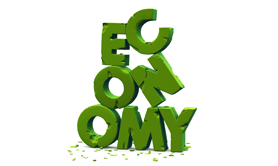Economy and Management
Pakistan's economy is undergoing a structural transformation characterized by de-regulation, privatization, trade liberalization, and emergence of sectoral regulators. This rather speedy transition has produced mixed results so far. Pakistan has been able to attract sizable foreign direct investment, particularly in services sector. However, the promises made to the general public like provision of better quality services, reduction in tariffs, enhanced consumer choices and responsiveness of entrepreneurs to consumer concerns are yet to be materialized for most of the citizens. There has been criticism of hasty privatization of profit-earning public enterprises and providing sovereign guarantees to select companies.
Market is largely flawed due to cartels, oligopolies and monopolies. Pakistan is striving hard to come up with effective competition laws and regulations and an effective enforcement culture. Pakistan has not been able to evolve a robust regulatory framework and institutional arrangement to ensure that legitimate interests of consumers, investors, and entrepreneurs are protected. Moreover, economic reforms as a vehicle of development and poverty alleviation do not appear to be working.
The policy makers are facing daunting challenges such as a yawning trade and budget deficit. Other challenges include shortage of essential commodities; slowdown in the economy, particularly, in the manufacturing sector with attendant unemployment; declining competitiveness of many sectors; growing inequalities with allied social problems; inability to improve quality of human resource as compared to its major international competitors; weakness of stabilization policies; slow pace of reforms initiatives, and unabated inflation, etc.
Above problems make a perfect case for examining the very rationale and course of the structural transition in economy. There is mounting evidence that the national economy is likely to face unprecedented challenges in sustaining the existing level of growth in the coming months and years because of an ineffective institutional response and a lack of domestic preparedness to compete internationally. The combined impact of recurrent governance crises, weak market regulation, and inadequacy of social protection is visible in the form of low indicators of human development. There is a serious need to revisit the complex relationship between development strategies, trade policies and human development in Pakistan and optimize them to work for a common citizen. We also have to effectively manage and enhance the competitiveness of our firms, businesses and institutions on urgent basis.
While Pakistan is a willing partner in globalization, the shift towards a knowledge-based economy is not taking place in contrast to many of our competitors passing through similar changes. The kind of legal expertise, economic research capabilities, and policy entrepreneurship, which the ongoing structural transformation in the emerging global trading system demands, are greatly missing.
I-SAPS strives to fill this gap by undertaking research and analysis on managing emerging challenges in economy, market, trade and development. Having realized the lack of coordination and linkages among academia, business sector and policy community, I-SAPS works closely with all these sectors for informed and evidence-based policy engagement and advice.



